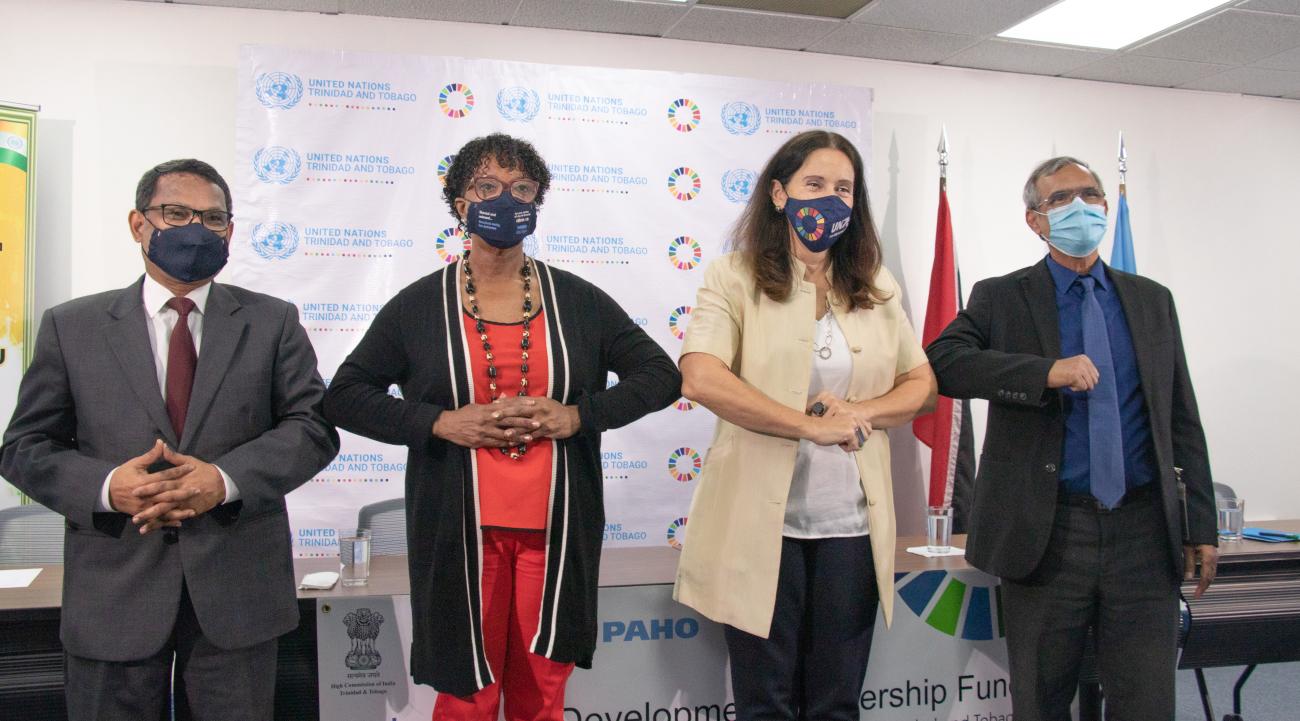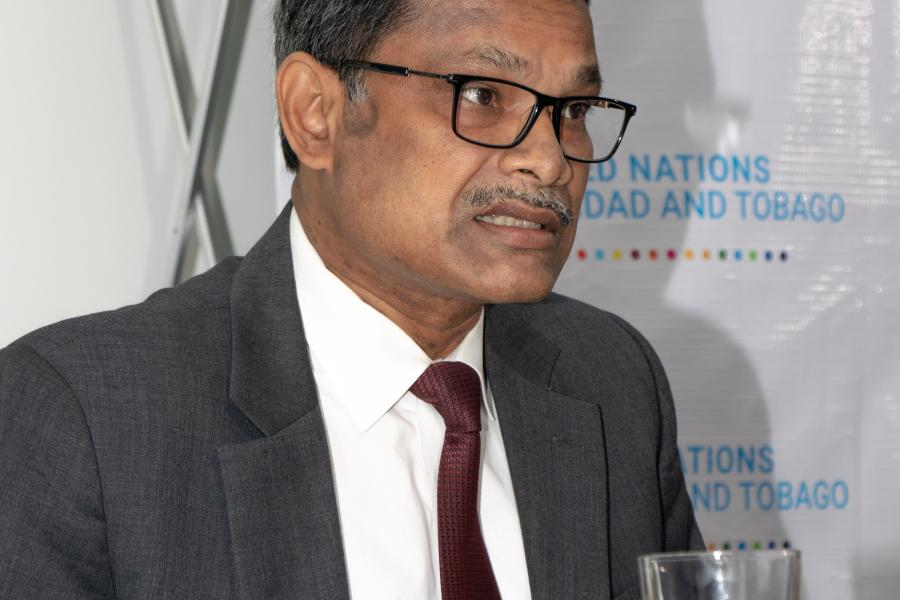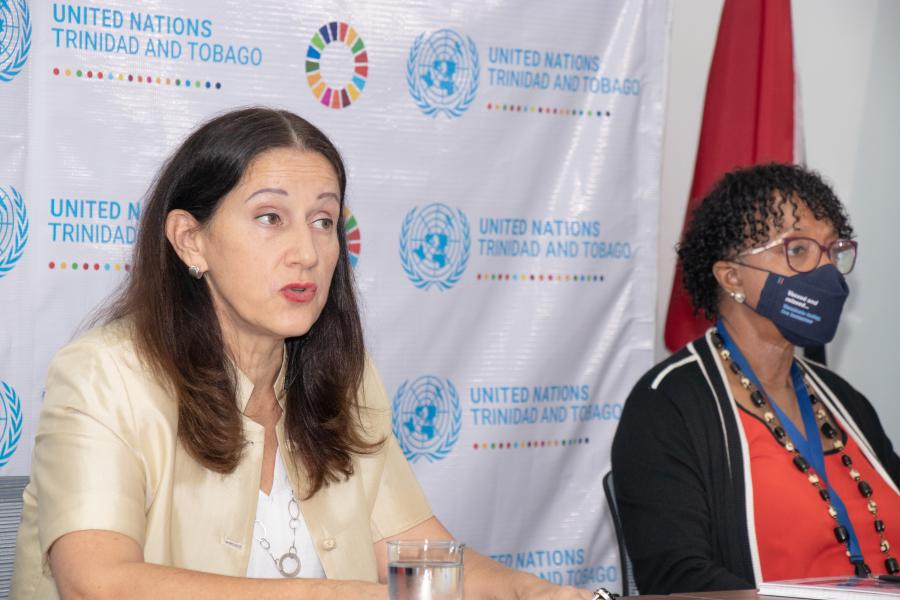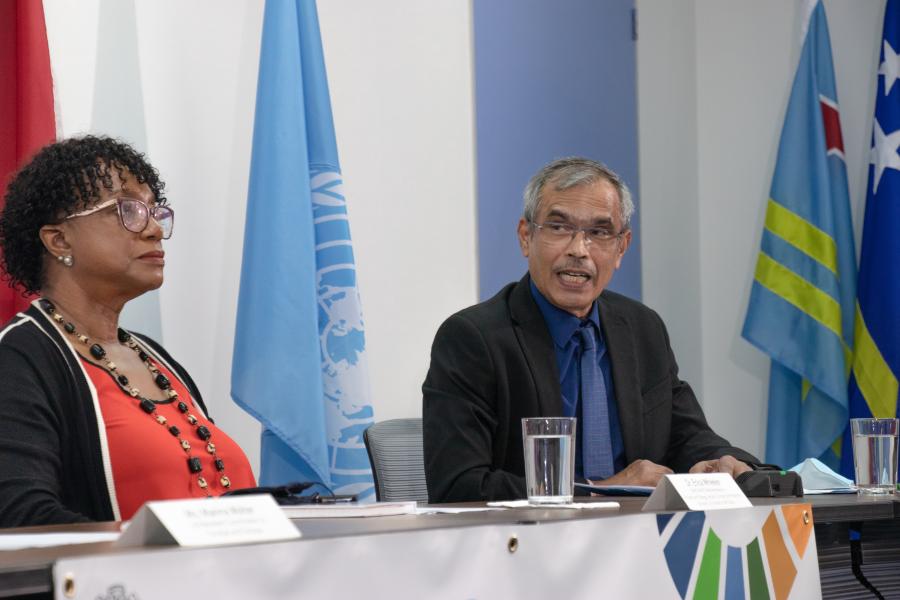Media release: India-UN Development Partnership Fund Brings US$1m in Robotics, Technology and Resources to T&T’s Covid-19 Response

US $1m in funding from the Government of India to help bring High and Low Technology to T&T's Healthcare System
October 21, 2021: Over the next 12 months, a US $1m grant will support the introduction to T&T of mobile healthcare robots, a telemedicine system, hand hygiene stations accessible to Persons with Disabilities and thousands of washable face masks for persons with underlying health conditions, as part of a project under the India-United Nations Development Partnership Fund.
The fund was formally launched during a ceremony at the Office of the United Nations Resident Coordinator, Ms. Marina Walter, this morning.
Under the India-UN fund, the Government of India has provided US $1m in financing to support T&T’s response to the Covid-19 pandemic. This funding will support the healthcare project entitled, “Bringing High and Low Technology (HALT) to Covid-19 in Trinidad and Tobago,” which commenced in September 2021.
The project is a partnership between the Government of Trinidad and Tobago (represented by the Ministry of Health), the Pan American Health Organization/World Health Organization (PAHO/WHO) and the United Nations Resident Coordinator’s Office. PAHO/WHO’s country office in T&T will manage implementation, with support from the United Nations Resident Coordinator’s Office and technical advice from the University of Trinidad and Tobago (UTT).
T&T’s healthcare system will benefit from four major outputs of the HALT project:
- A deployed telemedicine service that will allow medical professionals to remotely serve at least ten individuals simultaneously. This system will make healthcare more accessible to the elderly, Persons with Disabilities and Spanish speakers, while limiting the need for physical interaction between medical staff and patients to reduce the risk of transmission of Covid-19. It will also preserve medical resources for the neediest cases.
- Eight (8) mobile healthcare robots that can be used during preliminary patient registration, patient evaluation and communication with patients (including Persons with Disabilities and Spanish speakers), thereby reducing human-to-human contact between incoming patients and frontline healthcare workers. Additionally, the robots can be subsequently repurposed for other uses such as the screening of passengers at air and sea ports, as the pandemic subsides.
- Fifty (50) hand hygiene stations that will be accessible to Persons with Disabilities. Each station will have enough soap for five million (5,000,000) uses.
- Fifty-five thousand (55,000) washable masks to be distributed to persons with a high risk of contracting Covid-19, such as the elderly and persons with underlying health conditions.

Speaking during the launch ceremony, the High Commissioner of India to T&T, His Excellency Arun Kumar Sahu, said, “The India-UN Development Partnership project is an integral part of India's development partnership, contributing immensely to achieving integrated, aligned and coherent implementation of the Sustainable Development Goals. During the first-ever India-CARICOM Summit on September 25, 2019, at the UNGA's sidelines, Prime Minister of India, Mr Narendra Modi, announced a US $14-million grant for community development projects in Caribbean nations. By implementing these projects, India is fulfilling its commitment to the people and government of Trinidad and Tobago.”
Ms. Walter said of the partnership, “It embodies the true spirit of the UN: of countries and, especially emerging economies like Trinidad and Tobago and India, supporting each other to overcome the challenges that affect us all, like the Covid-19 pandemic. The HALT project, in particular, acknowledges that to conquer Covid-19, we need to do a mixture of simple things like wearing masks and washing our hands, and that we need 21st century tools – solutions crafted by human ingenuity and innovation - to fight a 21st century global pandemic.”

PAHO/WHO Representative to T&T, Dr. Erica Wheeler, said use of the telemedicine system to provide psychological support is a key objective of this initiative.
“The pandemic has been burdensome in many ways, not least of which is the anxiety, fear and worry associated with the possibility of infection. Much of these stressors fall on women to manage and it has been noted that women have been disproportionately affected during the pandemic, whether through loss of jobs, having the major responsibility to care for children who had to be home while schools were closed, or experiencing increased gender-based violence. Additionally, professionals such as healthcare workers, teachers and persons described as essential workers have been stressed as they adjust to the increased demands placed on them due to the pandemic. The telemedicine system can help bring these populations much needed support for their mental health and wellbeing.”
Dr. Wheeler added that while some of the 8 mobile healthcare robots will be imported, there will be discussions with UTT to explore the possibility of spearheading local development of these medical robots. This aspect of the initiative will build local capacity.

UTT has pioneered robotics research and development as part of its commitment to innovation. UTT President, Prof. Prakash Persad, said the university will assemble a multi-disciplinary team of experts to support implementation of the HALT project.
Prof. Persad said, “In our previous projects, we would have seen that people have a reluctance towards new technology in their presence. We learned a lot about how we can integrate technology into human interaction in a way that is accessible. Whatever lessons we have learned, we want to bring to this project to ensure the project is successful.”
The India-UN Development Partnership Fund was created in response to the appeal from the United Nations Secretary General, António Guterres, to develop integrated approaches to support countries, and particularly the most vulnerable, in navigating the complexities of the Covid-19 pandemic.
-- END--
For additional technical information on the execution of this project, please contact the PAHO/WHO Representative to Trinidad and Tobago, Aruba, Curaçao, Sint Maarten, Bonaire, St. Eustatius and Saba, Dr. Erica Wheeler, at 612-2001.




